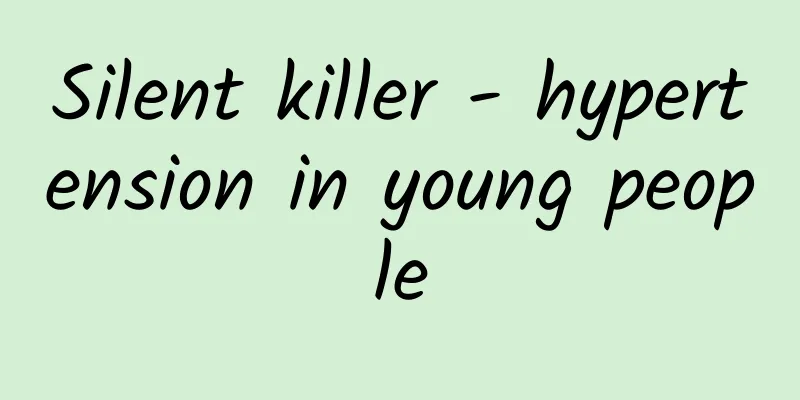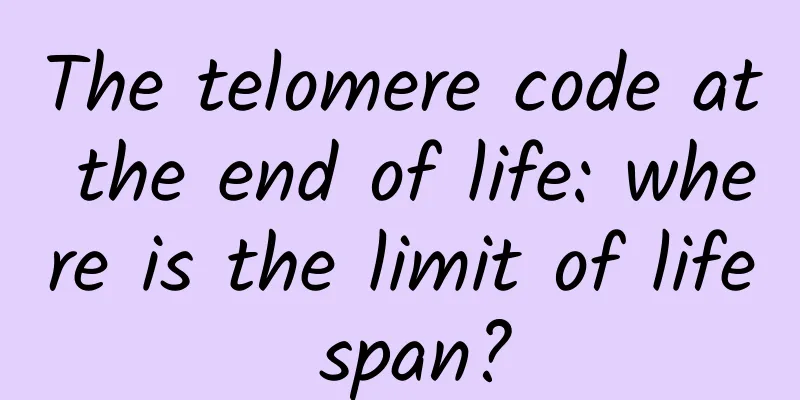Silent killer - hypertension in young people

|
Author: Yin Na, Beijing Hui Hospital Reviewer: He Yanbo, Chief Physician, Beijing Huimin Hospital With the rapid development of social economy and changes in lifestyle, the age of onset of hypertension in my country is showing a trend of getting younger. According to the nationwide hypertension survey in 2018, the prevalence of hypertension among residents over 18 years old in my country is about 27.5%. The prevalence of hypertension in the population increases significantly with age, but the rising trend of hypertension prevalence among young and middle-aged people is more obvious in recent years. Between 1991 and 2015, the prevalence of hypertension in people aged 60-79, 40-59 and 20-39 increased by 25.1%, 87.4% and 144.4% respectively. The China Hypertension Survey from 2012 to 2015 showed that the awareness rate, treatment rate and control rate (three rates) of hypertension in people over 18 years old were 51.6%, 45.8% and 16.8% respectively. The "China Cardiovascular Health and Disease Report 2021" survey shows that compared with elderly hypertensive patients, the low three rates of young and middle-aged people are particularly prominent. Young people often have no obvious symptoms of hypertension, lack awareness of the dangers of hypertension, and have concerns about medication, resulting in low rates of the three. Once young people are told that their blood pressure is high, they often cannot accept it and often have the following soul-searching questions: Why do I have high blood pressure at such a young age? I don’t even feel it? Can I not take medicine when I’m still so young? Do I have to take medicine for the rest of my life? Medicines have side effects. Will they damage my kidneys? What else can I do besides taking medicine? Before answering the above questions, let us first understand the dangers of high blood pressure. (1) Heart damage: Long-term hypertension can lead to changes in heart structure and function, which may eventually cause coronary heart disease (angina pectoris, myocardial infarction), heart failure, arrhythmia and even sudden death. Many people close their eyes and never open them again, which may be caused by this condition. (2) Cerebrovascular accident: Hypertension is the main cause of cerebral hemorrhage and cerebral infarction. Hypertension causes hardening, narrowing or even occlusion of cerebral arteries, leading to cerebral hemorrhage and cerebral infarction, resulting in paralysis in bed, and eating, drinking, defecating, urinating and sleeping are no longer under one's control. (3) Kidney damage: Hypertension damages the kidneys gradually and insidiously. Long-term hypertension leads to sclerosis of the renal arterioles and a gradual decline in renal function, which may eventually develop into renal failure. Even urination, a personal problem, requires the use of a cold machine. (4) Retinal disease: Hypertension can also affect the blood vessels in the fundus, causing spasm and hardening of the retinal arterioles. In severe cases, exudation, bleeding and papilledema may occur, affecting vision and even causing blindness. The eyes will turn black and the person will be unable to see anything. (5) Peripheral vascular disease: Hypertension can accelerate atherosclerosis of the lower limb arteries, leading to stenosis or occlusion of the lower limb arteries, causing symptoms such as intermittent claudication and rest pain. In severe cases, it can lead to limb necrosis and require amputation. Figure 1 Copyright image, no permission to reprint So, why is hypertension becoming more and more common among young people? As we all know, hypertension is the result of the combined effects of genetic factors and risk factors. Most young people with hypertension often have a history of hypertension in their immediate family. On the basis of genetic factors, with the blessing of bad living habits, hypertension is increasingly "favoring" young people. These bad living habits include: high-salt diet, smoking, alcoholism, obesity, mental stress, staying up late to play with mobile phones, playing games, lack of exercise and lying down, etc. Figure 2 Copyright image, no permission to reprint Can I stop taking medicine after being diagnosed with hypertension? If the blood pressure is only slightly elevated, below 160/100 mmHg, you can first change your lifestyle to treat high blood pressure. This includes the following: (1) Limit sodium intake: The daily salt intake per person should not exceed 6 grams (the amount of salt in a beer bottle cap). Pay attention to the intake of salt-containing condiments such as pickles, MSG, soy sauce, vinegar, etc. Eat more vegetables, fruits, milk, etc. rich in potassium and calcium. Through dietary adjustment, systolic blood pressure can be reduced by 8~14 mmHg. (2) Control weight: body mass index (BMI) <24 kg/m2, waist circumference <90 cm for men and <85 cm for women. (3) Quit smoking and avoid passive smoking: After quitting smoking, in addition to lowering blood pressure, the efficacy of antihypertensive drugs will also be greatly improved. (4) Quitting drinking: Drinkers have an increased risk of stroke, so it is recommended not to drink. Patients with hypertension who are currently drinking are advised to quit drinking. (5) Physical exercise: Regular moderate-intensity exercise, 30 minutes each time, 5 to 7 times a week; keep warm during exercise; avoid high-incidence periods of cardiovascular events and choose to exercise in the afternoon or evening; dress comfortably and choose a safe place; do not exercise on an empty stomach to avoid hypoglycemia; stop exercising if you are sick or feel unwell during exercise. (6) Reduce mental stress: Maintain psychological balance and seek professional psychological counseling when necessary. However, if the above methods cannot control blood pressure below 140/90 mmHg after 3 months, you should see a specialist and seek drug treatment. So can antihypertensive medications be stopped? If blood pressure rises significantly, blood pressure is greater than 160/100 mmHg, or blood pressure is slightly elevated and changes in lifestyle do not improve significantly or are difficult to maintain, then antihypertensive drug treatment needs to be initiated. So if blood pressure drops to normal after taking the medicine, can the antihypertensive medicine be stopped? The reason why blood pressure is normal after taking the medicine is the result of the action of the medicine and the balance under the control of the medicine. After the antihypertensive drug is discontinued, the balance is broken and blood pressure will inevitably rise again. Just like we need to eat three meals a day, if we only eat one meal in the morning, we cannot guarantee that we will not be hungry at noon and in the evening. Take medicine when it is high and stop taking medicine when it is normal. This "on-demand" medication mode will cause blood pressure to always fluctuate, and complications such as myocardial infarction and cerebral infarction often occur when blood pressure fluctuates. Therefore, you must take medication even if your blood pressure is normal, and learn to self-monitor your blood pressure and adjust medication under the guidance of a doctor. Next, do antihypertensive drugs have side effects? Will they damage the kidneys? This is actually a wrong concept. It is not the antihypertensive drugs that damage the kidneys, but the high blood pressure itself. If high blood pressure is not controlled for a long time, renal arteriosclerosis will continue to progress, and renal function will continue to deteriorate, even leading to renal failure, requiring long-term hemodialysis, and even expensive kidney transplants. It is true that any drug has side effects, but if the drug is used under the guidance of a doctor, the side effects will be very mild. The sartan, pril, and dihydropyridine antihypertensive drugs we commonly use even have a protective effect on the kidneys, especially the first two types of drugs are the first choice for chronic kidney disease. Finally, what else can you do besides taking medication regularly as directed by your doctor? In addition to the above-mentioned lifestyle changes, scientific blood pressure monitoring is also required: blood pressure should be controlled below 135/85mmHg, and if tolerated, below 130/80mmHg. It is recommended to use a verified upper arm medical electronic blood pressure monitor, and it is not recommended to use electronic blood pressure measuring devices in other parts such as wrist blood pressure monitors and finger blood pressure monitors. People with unstable blood pressure should measure their blood pressure every morning before taking medication, after urination, and before going to bed at night, 2 to 3 times each time, with an interval of 3 to 5 minutes each time, and take the average value; those whose blood pressure is stable and meets the standard can self-test their blood pressure 1 to 2 days a week. However, if measuring blood pressure makes you feel anxious, it is not recommended to frequently self-test your blood pressure. Hypertension is often called a "silent killer", and it is particularly prominent in young people because it may not have any symptoms in the early stages of harming the body, often giving people the illusion that "hypertension is not a disease". Common cerebral infarction, cerebral hemorrhage, coronary heart disease, renal failure, etc. in life are all caused by hypertension, or hypertension is the main participant. When irreversible harm occurs, it is too late. As the backbone of the family and society, young people especially need to recognize and pay attention to hypertension, and manage hypertension scientifically in order to have a high-quality healthy life. |
<<: Where is the future of “lacunar infarction in imaging reports”?
>>: Revealing the secrets of craniotomy, is it really as scary as imagined?
Recommend
Postpartum uterine involution
Women should pay attention to body recovery after...
How many days after menstruation is it easy to get pregnant?
Now as people's knowledge becomes more and mo...
HCG drops in early pregnancy without bleeding
Can a decrease in hCG in early pregnancy help pre...
Will COVID-19 have any "aftereffects"? Experts explain and tell you!
According to statistics from the World Health Org...
The blood vessels that the human body fears most are blocked! Many cerebral infarctions and strokes are related to them! Teach you 4 ways to improve carotid artery plaques
Carotid artery, the blood vessel that the human b...
Tips on how to peel and shell chestnuts? Tips on how to peel and shell chestnuts?
Chestnuts contain unsaturated fatty acids, vitami...
Severe pain in the lower left abdomen during menstruation
Lower abdominal pain during menstruation is a com...
Where to start visiting Shichahai in Beijing? How to visit Shichahai in Beijing?
Shichahai is located in the central urban area of...
The whole process of postpartum pelvic floor screening
Caesarean section delivery is more harmful to the...
What does double sheep double wool twins mean?
With the use of ovulation-stimulating drugs and t...
What are the pre-pregnancy examination items for hydatidiform mole?
If we want to effectively avoid glucose, we shoul...
What to eat is good for breasts?
Breasts are a special organ of female body and a ...
The difference between breast nodules and cysts
When going to the hospital for a physical examina...
Three common breakfast combinations are actually very unhealthy. Are you one of them?
Recently, the topic #Skipping breakfast makes you...









